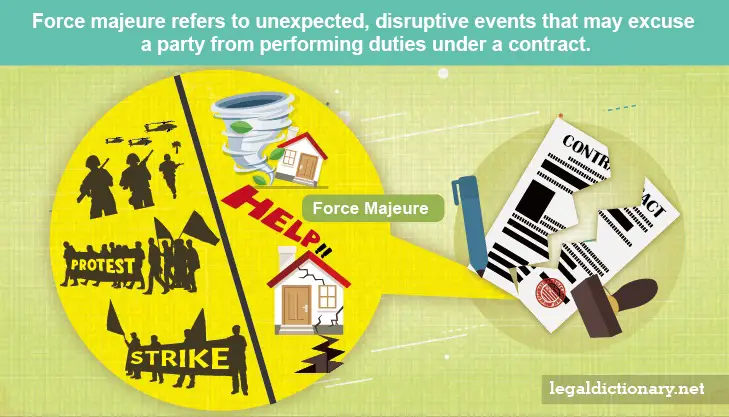Force Majeure
A French term that literally means a superior or irresistible power, “force majeur” is used in the legal system to refer to natural and unavoidable catastrophes that interrupt the expected course of events. Force majeure clauses are often found in contracts and insurance policies to protect the parties in the event duties cannot be performed due to causes outside the parties’ control. To explore this concept, consider the following force majeure definition.
Definition of Force Majeure
- Noun. Greater, superior, or irresistible force.
- Noun. An event that cannot be reasonably anticipated or controlled.
- Noun. An unexpected, disruptive event that may excuse a party from performing duties under a contract.
Origin 1880 French
Events Considered Force Majeure
A force majeure clause in a contract essentially releases both parties from obligation or liability when a circumstance beyond the parties’ control occurs preventing fulfillment of the contract. Such circumstances include war, riot, crime, or strike, as well as any event considered an “act of God,” such as an earthquake, hurricane, tornado, flooding, or volcanic eruption. In many cases where force majeure becomes an issue, the party’s duties under the contract are only suspended during the event.
Some extraordinary events, however, excuse both parties from fulfilling the contract permanently. For example, if Bob and Mary entered into an agreement to purchase a house from Sam, but the house was destroyed by a tornado prior to closing, all parties would be released from the agreement. Bob and Mary would not be required to make good on their promise to purchase the property, and Sam would not be required to come up with a house to sell to Bob and Mary.
Force Majeure in Contract Negotiations
Because force majeure relieves a party of its duties under a contract, the issue of specifying exactly what may be considered an event under force majeure is critical in negotiating the contract. It may be important for a party to resist efforts of the other party to include events that, practically speaking, should be at that party’s risk. For example, in an oil supply agreement, the oil company may seek to include “supply risk” as a force majeure event. The oil company should, however, have already done extensive analysis of its oil reserves and production forecast before engaging in contract negotiations to deliver any oil.
Acts Not Regarded as Force Majeure
While the interpretation of force majeure may be stretched to cover such issues as labor strikes and breakdown of vital machinery, either of which may temporarily excuse a party from performance, such events as bad weather, funerals, sporting events, or other normal life events are not valid excuses under the law. The reasoning behind this is that these are normal occurrences that temporarily interrupt life and work, and the possibility of such an interruption should be considered by the parties in making a contract. In any case, a party seeking protection for non-performance under force majeure must prove he made a reasonable attempt to minimize delay or damages due to unexpected, yet foreseeable events.
Example Force Majeure Clause
While the specific events included in a force majeure contract clause are up to the parties, there are a number of events that are commonly used. When creating such a clause it is important to not only define the events covered, but what will happen in the event one of the events occurs, which party can suspend performance or terminate the agreement, and what happens in the event the force majeure event continues for a lengthy period of time.
Example:
A party shall not be held liable for failure of or delay in performing its obligations under this Agreement if such failure or delay is the result of an act of God, such as earthquake, hurricane, tornado, flooding, or other natural disaster, or in the case of war, action of foreign enemies, terrorist activities, labor dispute or strike, government sanction, blockage, embargo, or failure of electrical service. The non-performing party must make every reasonable attempt to minimize delay of performance. In the event force majeure continues longer than 120 days, either party may terminate the Agreement, repaying the full amount of the deposit within 10 days of termination notice.
Force Majeure vs. Impossibility
In contract law, “impossibility” provides a party with an excuse for failing to perform duties under a contract due to a change in circumstances that makes performance actually impossible to accomplish. For example, if Mr. Jones contracts to pay contractor Joe to paint his house on June 1st, but Mr. Jones’ house burns down on May 20th, both parties are excused from their duties under the contract, as it is now impossible to paint the house.
More and more often, the doctrine of “impossibility” is also cited when performance under a contract has, due to an unexpected change in circumstances, made performance excessively difficult or costly. This, historically, has been referred to as the doctrine of “impracticability.” This slight shift in functionality of the law has led to a bit of confusion on the topic of excused non-performance.
Force Majeure and the “Hell or High Water” Clause
A clause sometimes included in a contract for the purpose of limiting the use of force majeure and impossibility excuses is the “Hell or high water” clause. Named from the long-used colloquial phrase, the clause specifies that certain duties under the contract must be performed “come Hell or high water,” which is to say, regardless of any difficulties that may arise.
Related Legal Terms and Issues
- Contract – An agreement between two or more parties in which a promise is made to do or provide something in return for a valuable benefit.
- Performance – The fulfillment of a promise or obligation as required by the terms of a contract.
